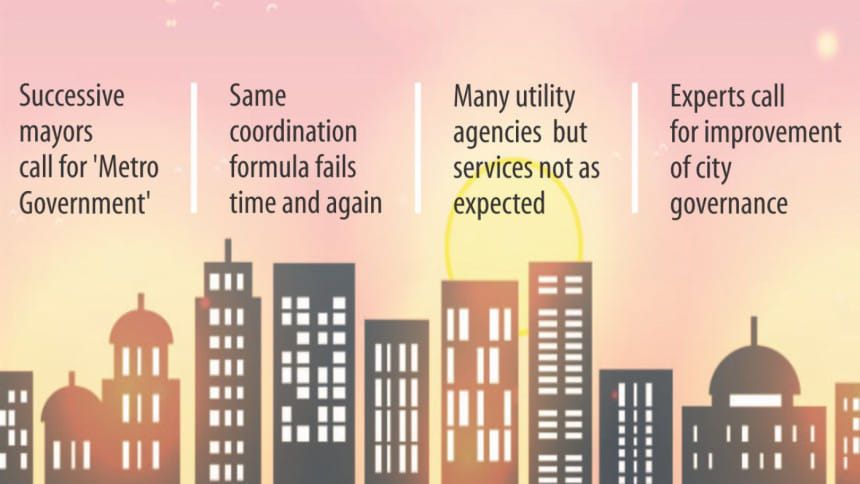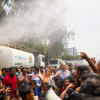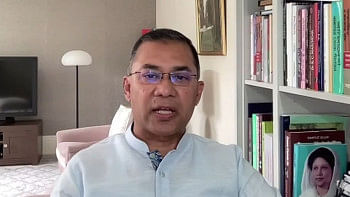City Governance: Who’s to blame for failure?

He once again expressed his utter frustration that the city corporation he has been leading for over two years lacks adequate jurisdiction to better serve the city dwellers.
He finds it difficult to develop the city by preparing a master plan because his office has no control over parks, canals, roads and drainage system.
Not only that. In his view, “many things have been grabbed” by powerful people and it is difficult to fight against them.
This is how Annisul Huq, mayor of Dhaka North City Corporation, described the situation at a programme on Saturday.
It is not the first time he did it though. Annisul, a successful businessman-turned-public representative, has done the same on several occasions since becoming mayor in May 2015.
READ MORE: Anisul blames homegrown mosquitoes
Sayeed Khokon, mayor of Dhaka South City Corporation (DSCC), has also voiced his frustration about how the city corporation lacks jurisdiction over other state service providers.
In September last year, for example, he said Rajuk designed a 20-year master plan for the capital without consulting his office.
But the mayors' outcry has made no difference even as the city people continue to suffer from perennial problems such as traffic jam and waterlogging. Latest on the list is the outbreak of chikungunya, an Aedes mosquito-borne disease.
The two mayors and governance experts have blamed the city's poor governance for the present situation. They said that in the matter of governance, the city corporations have little to do.
READ MORE: 21 areas most risky for chikungunya
About four dozen government organisations provide various services to the city people. These single-purpose organisations, such as Wasa and Rajuk, function under various ministries and the city corporations have no control over them.
Also, a lack of coordination among them leaves the city's development and maintenance in a mess.
For instance, the city corporations cannot make a master plan or take any drastic measures to address the waterlogging problem because at least seven other agencies, including Wasa, are tasked with maintaining the drainage system.
And yet, whenever the city goes under water, it is the mayors who take the heat of public criticism.
According to Prof Nizam Ahmed of the public administration department at Chittagong University, city people are suffering because of governance failure. There are many service-providing organisations, but none of them take responsibility for failing to serve people.
"We should specify who are responsible for the city governance and need to hold them accountable for their failure," he told The Daily Star yesterday.
He added that there was no alternative but to improve the city governance system to reduce people's sufferings. He also blamed the lax enforcement of law for the worsening situation, particularly in traffic management.
Prof Tofail Ahmed echoed Prof Nizam's view.
"Taxpayers are not getting service due to poor governance in the city," he told this paper yesterday.
METROPOLITAN GOVT: A POSSIBLE SOLUTION
Tofail, a local government expert, is in favour of the long-standing demand for introduction of a metropolitan government to overcome the present crisis.
The idea of such a government to bring major civic service providers under one authority was first floated by Mohammad Hanif, Dhaka's first elected mayor, in 1994.
His son, Sayeed Khokon, raised the same demand a few months after taking office.
Almost around the same time, Annisul spoke for a coordinated system like a city government to handle the problems.
Sadek Hossain Khoka, a senior BNP leader who was mayor of the undivided DCC from 2002 to 2011, also supported the idea of a metropolitan government.
This means all the Dhaka city mayors, irrespective of their party affiliations, have favoured a metropolitan government. But the idea never received serious attention of any government.
Both Prof Tofail and Prof Nizam think the government should now consider the introduction of a metropolitan government without delay to improve city governance.
Many cities around the world have such governments led by mayors.
Tofail prefers the Kolkata model for Dhaka and major cities in the country.
Mayor is the head of the city government in Kolkata, Kolkata Municipal Corporation (KMC).
A councillor who commands the support of the majority of councillors is elected mayor like the election of the prime minister in the parliamentary form of the government.
He appoints and leads a council, called mayor-in-council, resembling the council of ministers in the parliamentary form of government. Every member holds portfolios of various functional departments and is responsible to the corporation for their functions.
The corporation performs both obligatory and discretionary functions. The obligatory functions include providing civic services like water supply, sewerage and drainage, solid waste management, town planning and land use control and construction and maintenance of streets.
It performs some discretionary functions such as establishment of primary schools, setting up theatres and cinemas for public entertainment, and hospitals, dispensaries and clinics for healthcare.
Prof Nizam and Prof Tofail also suggested amending the laws to vest the executive powers of the city corporation in the council led by the mayor.
Currently, they said, the mayor holds all the executive powers. Councillors do not have any specific functions and jurisdiction. The current system does not go in line with the parliamentary form of government. Rather, it is fit for the presidential form of government.
ALTERNATIVE EFFORTS
Efforts taken by successive governments, however, suggest that they were aware of the crisis. But they had tried to do something in different ways.
For example, the Ershad government promulgated the Dhaka City Corporation Ordinance 1983 making chiefs of the service organisations --Rajuk, Wasa, Desa and DPHE -- ex-officio ward commissioners of the city corporation. The purpose was to bring better coordination among the core service providers.
But the move fizzled out as most of the senior officials who headed those organisations never turned up in the coordination meetings. Some point at bureaucratic vanity or departmental jealousy behind this failure.
When mayor Hanif raised the demand for a metropolitan government, the BNP was in power. But he did not get a positive response even after his party Awami League took office in 1996.
Overlooking Hanif's demand, the AL government formed a coordination committee for Dhaka city in 1996 with the then minister for LGRD as chairman and the then mayor as the co-chairman.
Chiefs of various civic service providers and MPs elected from the city were made members of the committee. Its goal was to ensure better management of services.
The committee held about a dozen meetings until October 1998 and “some progress” in waterlogged areas and mosquito control were the only outcomes, says an authoritative book: "Megacity Governance in South Asia: A comparative Study" by Kamal Siddiqui and others.
That move failed, according to the book, as the minister was too busy. He was there to exercise his control and not out of any genuine commitment to solve the problems of Dhaka city.
The minister-led committee ceased to exist after BNP leader Sadek Hossain Khoka was elected mayor in April 2002.
Hanif's successor, Khoka too did not get any support from his own BNP-led government from 2001 to 2006 for his plan to introduce a metropolitan government to improve civic facilities.
The then BNP-led government formed Dhaka Good Governance Committee headed by the principal secretary to the then prime minister. That committee could not make any breakthrough.
In 2011, the AL-led government divided the DCC into two -- DNCC and DSCC -- without any other reforms to strengthen the city corporations.
Both the city corporations were run by administrators, who were administrative officers, until two mayors were elected in 2015.
Around five years after splitting the DCC, the government has come up with an old formula to ensure coordination among the works of the city service providers.
In June last year, the Prime Minister's Office issued a circular asking the chiefs of all utility service providers in Dhaka to attend general meetings of the two city corporations and implement meeting decisions to improve civic amenities.
It is nothing new, as according to section 49 (15) of the city corporation law, at least the chiefs of 27 utility service providers, including water, gas, electricity suppliers, are supposed to attend the meetings of the city corporations.
The present situation in the city proves that no previous efforts made by the successive governments worked to serve people better by improving the city governance.

 For all latest news, follow The Daily Star's Google News channel.
For all latest news, follow The Daily Star's Google News channel. 








Comments